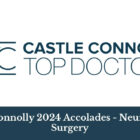Brain Aneurysms in Numbers
Unruptured brain aneurysms are not uncommon in the general population, affecting approximately 3.2% of adults worldwide, usually around the age of 50. Advances in high-resolution magnetic resonance imaging (MRI) have led to an increasing number of these aneurysms being detected.
Most of these aneurysms will remain stable and never rupture. To illustrate, among one million adults aged 50, roughly 32,000 may have an unruptured brain aneurysm. However, only 0.25% of these (or 1 in 400) are likely to lead to a break open rupture.
To put this into perspective, in any given year, about 80 out of 32,000 of these unruptured brain aneurysms would be expected to lead to brain bleeding, known as subarachnoid hemorrhage.
This is a medical emergency, and you need to call 911. Symptoms are usually described as the worst headache of life, stiff neck and blurry vision that happen very suddenly.
In many cases, aneurysms are small and go unnoticed throughout a person’s life. But if an aneurysm grows larger or ruptures, surgery may be necessary to seal it with a permanent small metal clip or other medical devices.
If you are a candidate for this procedure, understanding what to expect before and after the surgery can help ensure a smooth recovery from aneurysm treatment.
What Causes a Brain Aneurysm?
Brain aneurysms, also known as cerebral aneurysms, can have various causes and can go undiagnosed as long as they do not produce symptoms.
Inherited Conditions
Some aneurysms are present at birth, caused by abnormalities and weak areas in places where blood vessels join. Others arise from inherited connective tissue disorders and conditions such as Marfan’s syndrome or polycystic kidney disease.
Chronic and Acute Health Conditions
Conditions such as atherosclerosis (hardening of the arteries) and high blood pressure can make people more susceptible to aneurysms. Although rare, infections of the artery wall can weaken its structure and lead to an aneurysm.
Events and Lifestyle Choices
Certain types of aneurysms can be triggered by head injuries or trauma. People who smoke, drink alcohol, or misuse drugs, particularly cocaine, have an increased risk of aneurysms.
Who Requires Surgery?
Many small aneurysms never cause any symptoms and may be discovered incidentally during routine examinations or tests for other health conditions.
However, if an aneurysm enlarges, putting pressure on the surrounding brain tissues, it can lead to symptoms such as severe headaches, vision disturbances, and issues with coordination, speech, or memory, often accompanied by headaches.
If you experience these symptoms or if testing reveals the presence of a brain aneurysm, surgical clipping, or endovascular aneurysm treatment procedure may be necessary to prevent a rupture.
What are the risks of clipping surgery?
Clipping surgery is a well-researched and established treatment for many kinds of brain aneurysms. This procedure is generally safe and can resolve an aneurysm completely.
But it is an invasive surgery that does have some significant risks, including blood clots, brain swelling and the potential for neurological problems, such as confusion, or stroke-like impairment of speech or coordination.
Clipping surgery also carries the risk of seizures or vasospasm, a narrowing of a blood vessel in the brain that can occur days or weeks after surgery. A major risk of clipping surgery, especially when performed on a ruptured aneurysm, is re-bleeding from the aneurysm site. After clipping surgery, patients may also experience headaches and swelling in the face and around the incision site. As with any surgery, infection is also a risk.
Preparing for Your Aneurysm Clipping Procedure
If you have an unruptured aneurysm that requires clipping surgery, preparation for the procedure begins several days or weeks before the surgery itself, so you’ll be able to make any needed preparations for your hospital stay and recovery at home.
Before your surgery, you can expect to have a series of tests to assess your overall health condition and pinpoint the exact location of your aneurysm. Your medical team will meet with you to sign necessary consent forms and go over your pre-surgery instructions.
During this time, it’s important to talk with your doctors about any medications you may be taking for other conditions, as well as any supplements or alternative remedies you use, since they may affect the medication you’ll be given for surgery.
You may be asked to stop taking certain medications such as blood thinners or to change your usual dose prior to your surgery, or your doctor may prescribe new, pre-surgery medications. If you smoke or use alcohol, your doctors may ask you to stop.
Without complications, you can expect to stay in the hospital for two to three days. It is important to make all the necessary arrangements, such as taking caring of your dependents, missing work or school, and meeting any other obligations during your hospital stay. Pack a bag with any essentials you’ll need during your hospital stay, and update any care directives you may have. While you’re preparing for surgery, make plans for your return home, too.
Since driving and other activities will be restricted for the first few weeks, be sure to arrange for transportation and help with daily chores. Plan with supervisors or teachers to manage your absence from work or school.
We focus on outcomes not treatments.
Let's find the most appropriate solution to your Cerebrovascular condition.Clipping Surgery: What to Expect
Brain aneurysm clipping surgery begins with a craniotomy — an opening in the skull. The size and location of the incision depend on the location of the aneurysm. In some cases, only a small incision is needed to place the clip. In other cases, the surgeon must remove a portion of the skull over the aneurysm.
Your hair will be parted along the incision line without cutting or shaving it. Once the neurosurgeon has removed a small piece of bone, the brain folds will be spread to get access to the aneurysm. The neurosurgeon then places a metal clip across the “neck” of the aneurysm, where it meets the artery, to close it off. Once completely clipped, the aneurysm eventually shrinks and scars down.
The clip placed across the aneurysm will remain in place permanently and should not cause problems. The surgeon then closes the incision. Depending on circumstances, this might include replacing a portion of the skull and securing it with metal plates and screws for secure healing. You will be able to walk through airport security without setting off any alarms.
Recovery from Surgery
A ruptured aneurysm constitutes a medical emergency that requires immediate treatment. In the event of an aneurysm rupture, it leads to the release of blood into the brain tissue and spinal fluid, posing a grave risk of severe brain damage or even fatality. Following surgery, you will undergo thorough monitoring during a hospital stay that can last for several days to several weeks.
Recovering from such a critical health emergency is a gradual process, it may take weeks to fully recover.
During this recovery period, you may be prescribed medications to prevent brain swelling and boost your energy levels if you frequently feel tired.
Additionally, it’s advisable to consult with your doctor regarding alcohol consumption and avoid strenuous activity unless specifically advised otherwise. Walking boosts blood flow and aids in recovery. Your doctor will provide guidance on when it’s safe to resume normal activities and maintain a healthy lifestyle.
Clipping surgery is a highly successful and safe treatment for brain aneurysms. Though everyone’s situation is unique, clipping surgery can make it possible to return to normal life, with the aneurysm resolved.

About Dr. Dorothea Altschul
Dr. Dorothea Altschul is an accomplished neurointerventionalist in North Jersey and is the Clinical Director of Endovascular Services at Neurosurgeons of New Jersey, practicing out of their Ridgewood office located on East Ridgewood Avenue.






